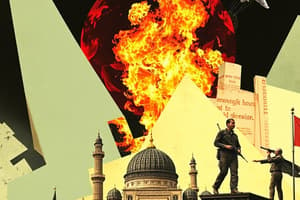Podcast
Questions and Answers
Which factor most significantly contributes to the ongoing difficulty in establishing a universally accepted definition of terrorism?
Which factor most significantly contributes to the ongoing difficulty in establishing a universally accepted definition of terrorism?
- The inherent political and normative dimensions associated with the term. (correct)
- The infrequent use of violence to achieve political goals.
- The consistent application of international laws across all nations.
- The lack of involvement of non-state actors in terrorist activities.
According to the Global Terrorism Database (GTD), what is a key criterion for an incident to be classified as terrorism?
According to the Global Terrorism Database (GTD), what is a key criterion for an incident to be classified as terrorism?
- The act must be carried out by a state actor.
- The act must involve violence. (correct)
- The act must be unintentional.
- The act must solely target military personnel.
Which of the following is NOT considered one of the four main ideological categories of terrorism?
Which of the following is NOT considered one of the four main ideological categories of terrorism?
- Religious
- New Left
- Environmental (correct)
- Far Right
Why are religiously motivated terrorists often more prone to engaging in mass casualty events compared to other types of terrorists?
Why are religiously motivated terrorists often more prone to engaging in mass casualty events compared to other types of terrorists?
What is the primary distinguishing factor between ethnic/nationalist terrorism and religious terrorism?
What is the primary distinguishing factor between ethnic/nationalist terrorism and religious terrorism?
Which of the following best characterizes left-wing terrorism?
Which of the following best characterizes left-wing terrorism?
During which wave of terrorism did anarchist ideologies predominantly influence terrorist activities?
During which wave of terrorism did anarchist ideologies predominantly influence terrorist activities?
What psychological process leads extremists to dehumanize those outside their group, thereby justifying violence?
What psychological process leads extremists to dehumanize those outside their group, thereby justifying violence?
According to rational choice theory, why might a terrorist group choose to engage in terrorism?
According to rational choice theory, why might a terrorist group choose to engage in terrorism?
Which of the following is a 'puzzle of terrorism'?
Which of the following is a 'puzzle of terrorism'?
According to the Natural Systems Model, what is the primary driver for individuals joining terrorist groups?
According to the Natural Systems Model, what is the primary driver for individuals joining terrorist groups?
Historically, what was the classical perceived relationship between democracy and terrorism?
Historically, what was the classical perceived relationship between democracy and terrorism?
What is a key problem with the classical perceived relationship between democracy and terrorism?
What is a key problem with the classical perceived relationship between democracy and terrorism?
What is a significant counterargument to the theory that economic deprivation is a primary cause of terrorism?
What is a significant counterargument to the theory that economic deprivation is a primary cause of terrorism?
According to social cleavage theory, what is a primary driver for radicalization and terrorism?
According to social cleavage theory, what is a primary driver for radicalization and terrorism?
What distinguishes domestic terrorism from international terrorism?
What distinguishes domestic terrorism from international terrorism?
How does the concept of 'relative deprivation' relate to terrorism?
How does the concept of 'relative deprivation' relate to terrorism?
Which of the following is a consequence of lacking a universally agreed-upon definition of terrorism?
Which of the following is a consequence of lacking a universally agreed-upon definition of terrorism?
What is one of the primary reasons that a consensus on the definition of terrorism is essential for advancing knowledge in the field?
What is one of the primary reasons that a consensus on the definition of terrorism is essential for advancing knowledge in the field?
Which of the following is MOST likely to be a goal of a nationalist/separatist terrorist organization?
Which of the following is MOST likely to be a goal of a nationalist/separatist terrorist organization?
Flashcards
Why is defining terrorism difficult?
Why is defining terrorism difficult?
Difficulty arises from the definition's mutability, political and normative aspects, and potential reporting bias.
GTD's definition of terrorism
GTD's definition of terrorism
Terrorism involves illegal force/violence by a non-state actor for political, economic, religious, or social goals through fear, coercion, or intimidation.
4 main ideologies of terrorism
4 main ideologies of terrorism
New left, far right, religious, and nationalist ideologies.
Why religious terrorists cause mass casualties
Why religious terrorists cause mass casualties
Signup and view all the flashcards
Significant religious terrorist organizations
Significant religious terrorist organizations
Signup and view all the flashcards
Ethnic/nationalist terrorism
Ethnic/nationalist terrorism
Signup and view all the flashcards
Significant nationalist groups
Significant nationalist groups
Signup and view all the flashcards
Left-wing/right-wing terrorism
Left-wing/right-wing terrorism
Signup and view all the flashcards
Significant left-wing terror groups
Significant left-wing terror groups
Signup and view all the flashcards
Four Waves of Terrorism
Four Waves of Terrorism
Signup and view all the flashcards
Psychological findings relevant to terrorism
Psychological findings relevant to terrorism
Signup and view all the flashcards
Rational choice in terrorism
Rational choice in terrorism
Signup and view all the flashcards
Examples of rational choice in terrorism studies
Examples of rational choice in terrorism studies
Signup and view all the flashcards
Natural Systems model
Natural Systems model
Signup and view all the flashcards
Problems with democracy-terrorism relationship
Problems with democracy-terrorism relationship
Signup and view all the flashcards
Relationship between economics and terrorism
Relationship between economics and terrorism
Signup and view all the flashcards
Social cleavage theory
Social cleavage theory
Signup and view all the flashcards
International vs. domestic terrorism
International vs. domestic terrorism
Signup and view all the flashcards
Relative Deprivation
Relative Deprivation
Signup and view all the flashcards
Consequences of lacking a terrorism definition?
Consequences of lacking a terrorism definition?
Signup and view all the flashcards
Study Notes
- Defining terrorism is difficult due to the mutability of definitions, political and normative aspects, and reporting bias.
GTD's Definition of Terrorism
- The threatened or actual use of illegal force and violence by a non-state actor to attain a political, economic, religious, or social goal through fear, coercion, or intimidation.
- Includes incidents that are intentional, involve violence, and are carried out by non-state actors.
Four Main Ideologies of Terrorism
- New left
- Far right
- Religious nationalist
- Ethnic/Nationalist
Religious Terrorism
- Religious terrorists are more likely to engage in mass casualty events due to:
- Apocalyptic or absolutist beliefs
- Divine justification over political rationality
- Group dynamics and radicalization
- Sacred texts and interpretations
- Lack of restraint from traditional morality
- Significant religious terrorist organizations:
- Al-Qaeda: Founded by Osama bin Laden; responsible for the 9/11 attacks and numerous bombings worldwide
- ISIS (Islamic State of Iraq and Syria): Known for mass executions, territorial control in Iraq and Syria (2014-2019), and global terrorist attacks
Ethnic/Nationalist Terrorism
- Involves the idea that a group must be separate from the rest to protect or save itself
- Aims to achieve political autonomy, independence, or supremacy for a particular ethnic or national group
- Primarily concerned with identity, self-determination, or perceived historical grievances, unlike religious terrorism
Significant Nationalist Groups
-Irish Republican Army (IRA) (Northern Ireland): Sought independence from the UK and reunification with Ireland; responsible for bombings and assassinations during the Troubles (1960s–1998) -Tamil Tigers (LTTE) (Sri Lanka): Fought for an independent Tamil state in Sri Lanka; used suicide bombings and assassinations, including the assassination of Indian Prime Minister Rajiv Gandhi in 1991 -Basque separatists (ETA) in Spain
Left-Wing/Right-Wing Terrorism
- Left-wing: Violence characterized by disdain for capitalism, imperialism, and colonialism, and by revolutionary procommunist/socialist beliefs, or support for a decentralized, non-hierarchical sociopolitical system
- Right-wing: Violence in support of the belief that a personal and/or national way of life is under attack and is either already lost or that the threat is imminent
Significant left-wing groups
- West German leftist group 1968-1998 The Red Army Faction/Shining Path: With most core members were university students carried out many bombings and armed assaults against police, U.S. military personnel, and journalists. They also assassinated several significant political & business figures and often cooperated with Palestinian groups & conducted hijackings
- Animal/Earth Liberation Front
The Waves of Terrorism
-First Wave: The Anarchist Wave (1880s–1920s) -Second Wave: The Anti-Colonial Wave (1920s–1960s) -Third Wave: The New Left Wave (1960s–1980s) -Fourth Wave: The Religious Wave (1979–Present)
Psychological Findings Relevant to Terrorism
- Ingroup-Outgroup Bias: Extremists dehumanize outsiders, justifying violence
- Role of Ideology & Justification of Violence, group identity, status, and belonging
Rational Choice Theory
- Individuals weigh the costs and benefits before engaging in terrorism.
- They see terrorism as the most effective way to achieve their goals.
- Example: Increased metal detectors lead to less terrorism.
Seven Puzzles of Terrorism
-Coercive ineffectiveness -Terrorism is not a last resort -Terrorists reflexively reject compromise -Terrorist orgs have vague political platforms -Terrorist orgs usually carry out anonymous attacks -Terrorist orgs attack each other more than a mutual enemy -Resist disbanding when they fail or if they are successful
Natural Systems Model
-People join for social reasons rather than political ones.
Classical Perceived Relationship Between Democracy and Terrorism
- Democracies are less likely to produce terrorism and more capable of addressing it peacefully
Problems with the Relationship Between Democracy and Terrorism
-Democracies can be more vulnerable to terrorism. -Civil liberties can be a double-edged sword. -Democracies are more likely to be targets of terrorism. -Legal constraints on security measures
Theorized Relationship Between Economics and Terrorism
-Poverty leads to terrorism -Unemployment and Terrorism -Poverty alone does not cause terrorism -Economic inequality, political grievances, and weak governance can create conditions where terrorism thrives -Well-educated and middle-class individuals often become terrorists
Social Cleavage Theory
-Explains how divisions within society shape political behavior, conflicts, and terrorism. -Divisions are based on factors like ethnicity, religion, class, or ideology. -Examples: -Exclusion from Political Power: Groups excluded from political representation are more likely to radicalize -Ethnic and Religious Grievances: When ethnicity or religion is tied to economic inequality, it can lead to violent extremism -State Repression and Identity Conflict: If governments repress certain groups based on social cleavages, it often fuels terrorism (e.g., the Palestinian-Israeli conflict)
International vs. Domestic Terrorism
-International: The nationality or foreign ties of its perpetrators, its location, the nature of its institutional or human victims, or the mechanics of its resolution, its ramifications transcend national boundaries
- Domestic: The nationality of its perpetrators and location of the act are the same
Relative Deprivation
- Feeling poor compared to others may fuel resentment and radicalization more than absolute poverty.
- Example: Many foreign fighters for ISIS came from wealthy Gulf states or Europe, where they felt socially or politically marginalized despite economic stability.
Importance of a Good Definition of Terrorism
- Without a consensus and universal definition:
- Cannot extradite people
- Cannot develop international law
- Cannot have universal condemnation for attacks
- End up spending more money
- Cannot advance knowledge
- Cannot provide guidance
- Too much time spent fighting over trivial things instead of conducting research
Studying That Suits You
Use AI to generate personalized quizzes and flashcards to suit your learning preferences.




